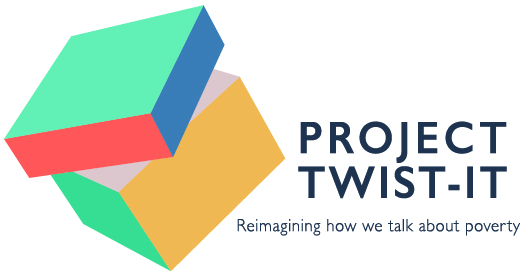What We Do at Project Twist-It
People living in poverty often feel like their voices and views are not heard. This is against a backdrop where they are frequently subject to negative narratives about their lives and experiences. Many of us will have experienced tough times financially, or know someone who has been through a similar thing, yet the stories and experiences of people struggling to get by have tended to be marginalised or misrepresented. Narratives about what it means to be poor tend to be imposed rather than derived from people with experience of poverty.
Project Twist-It takes a different approach.
Project Twist-It is a multi-platform storytelling initiative founded by someone who grew up in poverty. With the help of artists and writers inspired by the issue, it is a hub for telling stories that haven't been told and hearing voices not usually heard.
Our aim is to reflect the real, lived experience of people in poverty. We want to use the power of storytelling to change our collective understanding of what it means to experience it. We think that people with lived experience should do the talking, rather than being talked about.
“I’ve learned that people will forget what you said, people will forget what you did, but people will never forget how you made them feel.”
Why do we need project twist-it?
WATCH: PROJECT TWIST-IT FOUNDER MARY O’HARA DISCUSS THE IMPETUS BEHIND IT
Lizzie Hodgson of ThinkNation devotes an episode of Triple Think to finding out all about Project Twist-It. Watch to find out more about the content PTI has been producing, what we’re learning, and the exciting activity coming in the months ahead.
Project Twist-It is a collective of people, many of whom have lived experience of poverty, including writers and artists. The project was founded with funding from the Joseph Rowntree Foundation (JRF).
time to question the poverty story
Stories can move, excite, inspire and catalyse action. Stories can also encourage us to understand, empathise and identify with people different from ourselves or whose lives we might otherwise misunderstand or know nothing about.
Sometimes though, we need to question the stories we have been told. One of these stories has to do with poverty.
This project is a response to an enduring narrative in America and Britain that has framed our understanding of the causes and effects of poverty as an individual rather than as a collective issue.
For a long time in the US and the UK, two of the wealthiest yet most unequal nations on earth, the primary story told about poverty is that it is the fault of the individual and is the result of personal flaws or 'bad life decisions' rather than policy choices or economic inequality. In fact, some people believe poverty doesn't exist in wealthy countries while others argue that we have no choice but to accept that 'the poor' will always be with us.
This narrative, told over and over again by politicians and the media, has become deep-rooted in the minds of the public. It endures despite the realities of low pay, insecure work, high housing costs and insufficient benefits systems. It misrepresents people in poverty and is a barrier to support for positive policy action.
This needs to change.
Our mission
First of all, we want to understand why the portrayal of poverty as an individual problem, rather than a collective issue to be solved together, has been so influential. Second of all, we want to explore the alternatives to this narrative. We want to tell a different story. We believe that - together - we can construct a more hopeful, forward-looking alternative to the dominant poverty narrative.
“Overcoming poverty is not a gesture of charity.
It is the protection of a fundamental human right, the right to dignity and a decent life. ”
We will help to carve out a new poverty narrative by:
Providing a dynamic space for stories to take shape.
Celebrating creativity and challenging orthodoxy.
Utilising multiple content platforms and social media.
Elevating the voices of people with lived experience.
Listening to the views and ideas of young people.
Sharing widely what we learn along the way.

